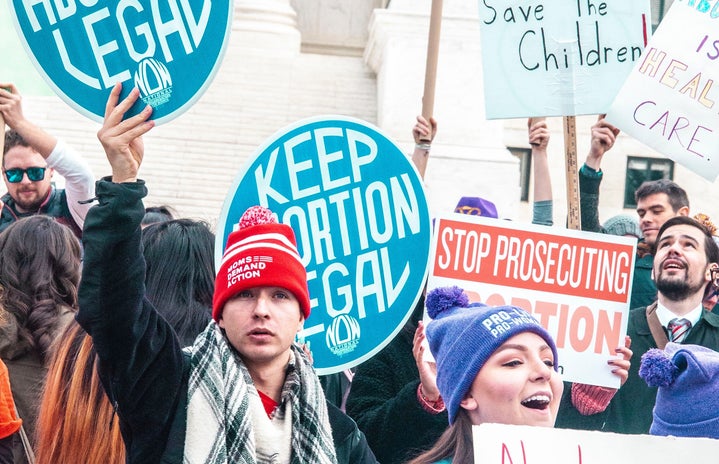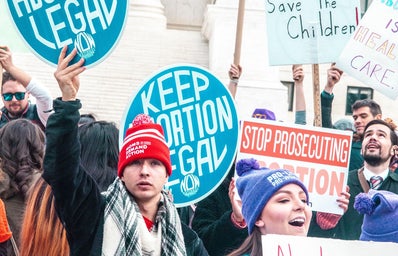By Ana S. Emmanuelli Micheli
On september 1st, horror struck the majority of women living in the state of Texas. Abortion, which is a necessity for many, was once again restricted, almost rendering it illegal. How did this law come to be? Well, there’s a lot that went into it. From trying to hold on to conservative views, to “writing over” past laws, the Heartbeat Bill has many motives.
Roe Vs. Wade
The legalization of abortion started back in 1971, when a woman from Dallas County, Texas, who went by the name Jane Roe, filed a lawsuit against the district attorney of said County, Henry Wade; the reason being that there had been a law signed that criminalized abortion unless the pregnant woman was at risk of dying due to said pregnancy. This meant that almost all abortions were illegal, including those resulting from rape or incest. Roe’s defense was that the law violated many amendments, specifically the Due Process Clause of the Fourteenth Amendment which provides a right to privacy and protection from state interference.
On January 22nd of 1973, The Supreme Court ruled that the constitution protects a pregnant woman’s right to choose to have an abortion, and it was decided that all first trimester abortions would be legal. As for the second and third trimester abortions, a viability test would be conducted in which an abortion would only be permitted if the pregnancy proved to be harmful.
Planned Parenthood Vs. Casey
In 1982, physicians and abortion clinics filed a lawsuit against The Pennsylvania Abortion Control Act. This act posed many obstacles to getting an abortion. Women would have to wait 24 hours in order to get the procedure done. During this period, women were informed about all the negative side effects of getting an abortion and were asked to provide “informed consent.” This meant that they would have to notify their husbands of their decision to have an abortion, minors would have to obtain consent from their parents or guardians, and clinics would have to report the procedure to authorities. The physicians and clinics alike considered all of these regulations to be unconstitutional and unnecessary. Finally, the Supreme Court affirmed Roe’s abortion rights, but broadened state authority to regulate it. However, these regulations cannot prevent a woman from accesing a legal abortion because they place an undue burden, which violates the constitutional right to an abortion.
The texas Heartbeat Bill
Texas’ Hearbeat Bill is a law that prohibits women from getting an abortion six weeks into pregnancy or when the fetuses’ heartbeat can be detected. Instead of the government enforcing this law, it has been decided that any private citizen can file a lawsuit against anyone that helps a pregnant woman get an abortion; including cases such as: providing money for the abortion, driving the pregnant woman to the clinic, and doing the procedure.
Although the law can’t criminalize the procedure if it is done outside state-borders, this is not a viable solution for many. Texas is a significantly large state, and there are a lot of people who can’t afford to cross state-borders or the procedure itself.
Reasons why this bill is problematic:
- Most people don’t know they’re pregnant 6 weeks in.
- This law does not take into account incidents of rape and/or incest.
- It violates Roe v. Wade and Parenthood v. Casey
- Only people who have been directly targeted by this law can testify against it, but the following are not valid defenses:
- The law is unconstitutional
- Relying on other laws that contradict the heartbeat bill, even if these haven’t been overturned.
- The pregnant person’s consent to getting an abortion.
- It can drastically increase maternal morbidity given that the pregnant person could take part in unsafe procedures in order to stop the pregnancy.
How we can help
There are several organizations that have been raising up money to secure safe abortions for low-income pregnant women in the state of Texas, apart from educating people on abortions and contraception. Here are a few:
- The Lilith Fund: This tax-exempt organization receives donations to help low-income pregnant people living in Texas get the necessary funds to get an abortion abiding by the state regulations. It hosts events in order to educate the community about the procedure and it gives people the opportunity to volunteer to help their cause.
- Jane’s Due Process: Jane’s Due Process is an organization that helps minors educate themselves about abortions, where to find an abortion clinic near them, and where to get contraception. It provides free legal assistance for minors who need a judicial bypass and is mainly running on donations.
- Whole Women’s Health Alliance: This non-profit organization helps educate people on safe abortion procedures, proper contraception, and provides emotional support throughout the whole process. Currently, it has three clinics: one in Indiana, one in Virginia, and one in Texas. This organization receives donations to keep its clinics running.
Texas’s heartbeat bill, or better known as SB8, is a highly unconstitutional law that endangers hundreds of pregnant people that live in the state. It is important that we educate others on these matters and that we help those affected by this law as best we can. Let’s stand together against adversity.
Further readings:
https://www.teenvogue.com/story/texas-abortion-ban-what-to-know-and-how-to-help
https://www.latimes.com/world-nation/story/2021-09-18/texas-abortion-united-states-constitution

